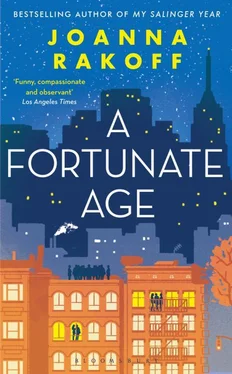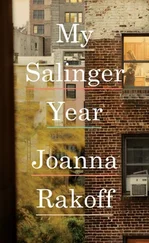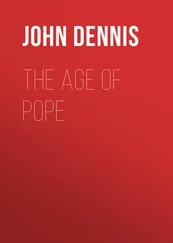“She manipulates you. She manipulates you,” she whispered into his chest. “Why do you let her? Why, Curtis? Why?” And then, plain as day, she saw the answer to her own question. She pulled away from him and wiped her hand across her nose.
“Hey, hey,” he said softly, and reached out a hand to gather her back into him, but she twisted away.
“You’re going to go back to her. You don’t think you are, but you are. Otherwise, you wouldn’t put up with this.” Curtis’s face went white.
“No,” he said. “Emily, how can you say that? That’s crazy. How many times have I told you that I love you . I want to be with you. You’re my special girl.” For a long moment he looked at her, almost as if he were seeing her for the first time. Then he ran his hand over his face. “Could I have a glass of that wine now?”
Emily nodded, stepped back to the counter, uncorked the bottle, and poured them each a glass. Drinks in hand, they sat side by side on the sofa, in silence. Finally, Curtis drained his glass in one draught and took Emily’s hand in his own. “It’s been hard,” he said. “She’s been a part of my life for so long—a part of my family, too—that I can’t imagine life without her.”
“I know,” said Emily.
“And she just can’t seem to manage on her own.” He looked at her sadly, his brows sliding closer together, and Emily saw that she was right—she hadn’t been sure of it until she said it—that he was going back to Amy. Already, he was looking at Emily like someone he used to love, something he’d sacrificed to the greater good. Amy was wrong about him after all. He wasn’t motivated by selfishness, but by a desire to set the world right that was as strong, stronger, than Amy the Anarchist’s. The thought made her ill—a great gob of something rising sickly in her throat, sweat prickling out all over her back—and she stole her hand back from Curtis.
“Why a few months?” she asked.
“What?” he asked.
“You said before that she wanted you to wait a few months. Why?” Curtis blinked, slowly, behind his glasses.
“Health insurance. I have it through my parents, still. She’s on my plan.” Emily nodded, worrying her lip—the tears were coming back. She hadn’t known that Curtis even had insurance, much less that he was responsible for Amy’s.
“Why,” she asked, “didn’t she bring this up in May?”
“Because,” he said, turning to face her, “in May she wasn’t pregnant.”
“Okay,” said Emily. A calm had come over her, giving her the peculiar feeling that she was watching someone else have this conversation with Curtis, rather than engaging with him herself. “Okay. I get it. I understand.” Curtis slid over and pulled her to him. This time, she didn’t resist.
“It’s not what you think,” he said. “It’s not mine. I never—”
“I don’t care,” she said. “I just don’t care anymore. Please. I don’t want to hear anything about it. I don’t want to know.” The tears, at last, made their slow, itchy march down her face, but they came with something like relief: these were the last tears she would cry over Amy, because it was over . She and Curtis were through. They were breaking up, to use the high school parlance. The thing she’d dreaded was now, finally happening. “Leave me alone,” she said. “Please just leave me alone.” And, to her surprise, he obeyed, pulling his warm arms away from her.
“You’re going to be fine,” he said. “You’re not like her. You’re strong.”
“ I know ,” she said, but he didn’t seem to hear her.
“Better than fine. You’re going to find someone better than me, someone who deserves you.” Can’t he, at least, spare me the clichés , she thought. But then he kissed the top of her head and she loved him all over again. And then, somehow, he was walking out the door.
In the dark courtyard, he turned and looked back at her, a black, stringy figure, like a rendering of Ichabod Crane she’d seen once, at the little museum in Sleepy Hollow. She raised a hand to him—a royal wave—and he to her. In a moment, he was gone and Emily’s tears stopped. She rose, creakily, from the couch, found a tissue, and blew her nose. It was unimaginable that Curtis wouldn’t simply walk back in the door, smiling his closemouthed grin, and crawl into bed with her. They wouldn’t make love again. Not ever. At this thought, her mind fell into a tailspin of sorts. She cupped her hands around her mouth, afraid she might scream, then drank down her goblet of wine and fell into a deep, restless sleep, splayed out on the small couch, still clad in her blue sundress with the apple print. At four, she woke and had a moment of warm, sleepy bliss before remembering what had happened. Her mind began to race. Dave’s party was tomorrow—no, today. Would Curtis go? Should she go alone? But then she’d have to explain what happened with Curtis. No, she couldn’t do it. She couldn’t tell them that Curtis had left her—Dave’s smug face materialized before her—and she certainly couldn’t do it at the party. She wouldn’t go. And perhaps she should call Curtis to let him know that she wasn’t going, so that he might go without her. No, no, God, what was wrong with her. Why was she worrying about denying Curtis the pleasure of her friend’s party?
And so her mind went, in circles and circles, until well past dawn, when she took off her dress, slid between her cool, clean sheets, and fell into a dreamless sleep. When she woke, the second time, it was after one; she was relieved, at least, that she’d slept through half the day—only eight more hours to get through before she could sleep again. She stayed in bed for as long as she could stand it, flipping through magazines she’d already read, ignoring the ringing of the phone. Eventually, sleep came again, then morning, and she rose and went to work, where she took great pleasure in doing everything absolutely perfectly: faxing and filing and photocopying with the utmost precision, answering the phone in exactly the way her boss preferred. At six, she raced to the train, as she always did, to get to her apartment before Curtis and, thus, have time to change her clothes, take a shower, smear on lip gloss. But as she pushed through the turnstile, she realized that Curtis, of course, wouldn’t be coming. There was no reason to rush home. She was free to do whatever she wanted: run errands, window-shop, meet friends, see a movie. A movie. A dumb, soppy, girly movie at the huge, awful multiplex by Union Square. Yes.
The 6 train rolled into the tiled station and she rose with the crowd and pushed her way onto it, but at Union Square, where she normally switched to the L, she walked up the stairs and into the park, crossed from the north to the south side of Fourteenth Street amid another, younger throng, and bought a ticket for the seven fifteen showing of a romantic comedy that Curtis had refused to see with her (“You should go with your girlfriends”). The theater was deserted, it being Tuesday, and she stood, bewildered, in the foyer for a moment, sick with regret. Going to the movies alone suddenly seemed pathetic. I should go home , she thought. I can’t sit through a movie. I should go home and lie down . But her home was haunted now, not by Amy, as on those gloomy Sundays, but by Curtis. “Okay,” she said aloud, glancing around to see if anyone had heard her, then strode out the glass doors onto Broadway, forcing her shoulders back, as she did in yoga class, her head high, and turned herself back north. She had forty-five minutes to kill and she would sit in Union Square, alone, and read the fat book that Sadie had given her, about a Midwestern family, a satire.
But the street was as crowded as the theater deserted. “Excuse me,” she said to the tourists in their polo shirts and khakis. “Sorry,” she said. “Can I just sneak by here,” she said to the clumps of hard, angry-looking teens awkwardly smoking menthol cigarettes and laughing so loudly she wanted to scream at them to shut up. “Ex cuse me,” she said, and edged by them, flattening herself against the window of the Virgin Megastore, where she found herself face-to-face with Curtis. Or, not Curtis himself, but his likeness: a blown-up image of the band’s album cover hung in the store’s southmost window. It took her a moment—more than a moment—to realize that this was indeed Curtis, her boyfriend until less than twenty-four hours before, staring at her from a piece of foam board, his name imprinted in white script, like handwriting, above his head, the other bandmembers standing slightly behind him, receding into the background as the label wanted them to (though Dave’s red hair flamed like a beacon). The teens kept laughing and laughing, until Emily began to wonder if they were laughing at her—if her skirt was tucked into her underwear or her face streaked with mascara—but, no, they were shouting, “Shaneekwa said what ?” and “She is stupid .” Emily was nothing to them, they hadn’t even noticed her, a small, sad girl—no, woman . To them, she was old, in her dull, gray shift. A nonentity, in the same negligible adult category as guidance counselors and youth ministers.
Читать дальше












